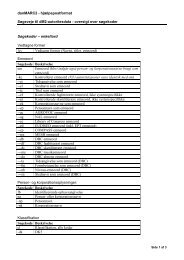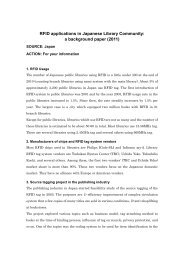RFID Data Model for Libraries - biblstandard
RFID Data Model for Libraries - biblstandard
RFID Data Model for Libraries - biblstandard
Create successful ePaper yourself
Turn your PDF publications into a flip-book with our unique Google optimized e-Paper software.
<strong>RFID</strong> <strong>Data</strong> model <strong>for</strong> libraries Doc 067<br />
Value:<br />
1<br />
Encoding:<br />
4 bit unsigned integer.<br />
3.2.1.2 Type of usage<br />
Description:<br />
− Acquisition:<br />
Item has not been entered into the library inventory yet, it can not be circulated.<br />
− Item <strong>for</strong> circulation:<br />
Any item <strong>for</strong> regular circulation.<br />
− Item not <strong>for</strong> circulation:<br />
The patron must not be able to checkout these items (but may do a checkin).<br />
− Discarded item:<br />
Item is discarded and permanently removed from circulation. It is recommended that<br />
security is in checked out state.<br />
− Patron Card:<br />
Indicates that this <strong>RFID</strong> Transponder is a patron card.<br />
Values:<br />
The following values are assigned:<br />
0: Acquisition<br />
1: Item <strong>for</strong> circulation<br />
2: Item not <strong>for</strong> circulation. The patron must not be able to checkout such items.<br />
7: Discarded item, this item must not be circulated.<br />
8: Patron Card<br />
Encoding:<br />
4 bit unsigned integer.<br />
3.2.1.3 Number of parts in item<br />
Description:<br />
‘Number of parts in item’ and ‘Ordinal part number’ are used <strong>for</strong> media package<br />
handling. ‘Number of parts in item’ does tell the number of Transponders or parts in a<br />
media package.<br />
Values:<br />
The number of parts in this media package (See example below).<br />
27




